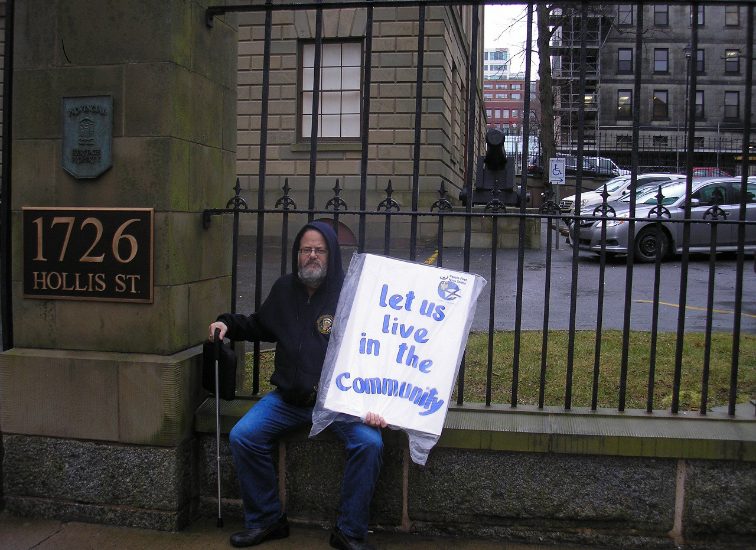
KJIPUKTUK (Halifax) – I remember how genuinely excited disability advocates were when in 2013 Denise Peterson-Rafuse, then minister of Community Services, announced a five-year plan to close down all large institutions for people living with physical or intellectual disabilities and provide them with the supports to live in their own communities, either in a small group home or in a place of their own.
Prior to that there had been a lot of negative publicity directed at the department. Residents were charged with assault by police for trivial reasons such as throwing teddy bears at staff. There were stories of physical, sexual and emotional abuse at these institutions, sometimes perpetrated by staff. I remember attending several rallies at Province House where disabled people, their allies and loved ones called for an end to institutionalization.
Initially the dramatic directional shift at the department seemed real, but the five year roadmap became a ten year project, and when the Liberals took over, the roadmap lost its urgency entirely, and despite ongoing lip service by Premier Stephen McNeil and Community Services ministers Joanne Bernard and Kelly Regan the roadmap stalled.
A report released by the Disability Rights Coalition (DRC) this Monday reveals how badly these targets have actually gone off the rails.
- the Nova Scotia government, through its Disability Supports Program, is assisting fewer people with disabilities in 2021 than in 2013/14 when it committed to the Roadmap, dropping from 5,184 to 5,033 people.
- Meanwhile, 1915 individuals are currently waiting for community living supports, which is almost double the number when the roadmap was published in 2013.
- DCS continues to exclude people with disabilities from receiving supports and services based on their disability and the government continues to institutionalize those people with disabilities in other institutions like hospitals and nursing homes as their only option.
- No institutions have been closed. In fact, just recently a policy that any admission to an institution be temporary was quietly dropped a couple of months ago.
“I didn’t realize the extent that community Services kept a lid on the number of people that they assist. In fact, it’s even fewer people than it was in 2013. To me that is shocking,” says Claire McNeil, a lawyer who represented the DRC at the human rights case on behalf of several people who were institutionalized against their will and without medical justification.
See also: People with disabilities assert their rights in the Nova Scotia Court of Appeal
What the list shows is how many people are in exactly the same boat as the three plaintiffs who won their individual cases.
“It really looks like Community Services is making no attempt to keep up with demand. They’re just keeping a lid on it,” McNeil says.
To say the people waiting for support are on a waitlist does not quite reflect what is happening on the ground, says McNeil.
“It’s like no waitlist you and I have ever encountered in our lives. Community Services tells you that they can’t help you, and by the way, we’ll take your name. And don’t get back to us. And we won’t get back to you… Meanwhile, older parents who have adult children living with them, they’re just despairing,” she says.
There still is time to turn things around.
“There is still a 30-month window for the Province to meet its Roadmap commitments. To do so however, requires immediate and concrete government action that places ‘equity and inclusion at the heart of everything the Province does”, a press release issued by the DRC states.
The DRC is asking that you let your elected representative and the candidates in this provincial election know how you feel about the foot-dragging by the provincial government on their promise of equality in inclusive communities for people with disabilities. Check this link for details, and a sample letter that you may find helpful.
See also: Nova Scotians with disabilities want community-based living supports now
Check out our new community calendar!
With a special thanks to our generous donors who make publication of the Nova Scotia Advocate possible.
Subscribe to the Nova Scotia Advocate weekly digest and never miss an article again. It’s free!



